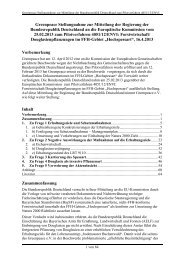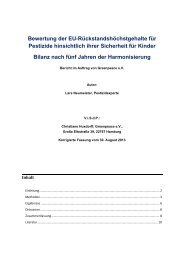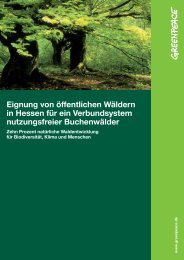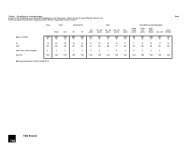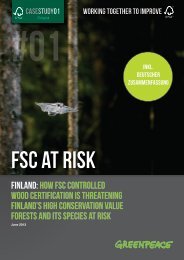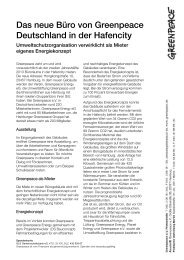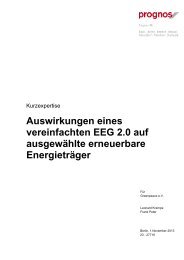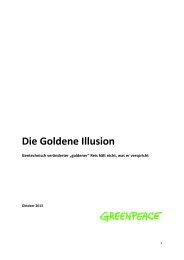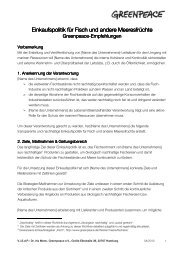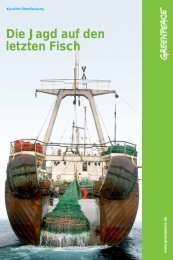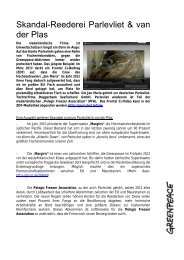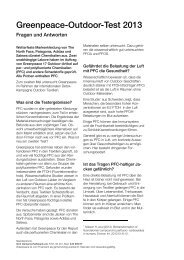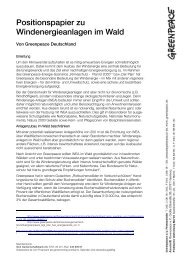Untitled - Greenpeace
Untitled - Greenpeace
Untitled - Greenpeace
You also want an ePaper? Increase the reach of your titles
YUMPU automatically turns print PDFs into web optimized ePapers that Google loves.
CARVING UP THE CONGO<br />
17<br />
GREENPEACE INVESTIGATIONS EXPOSE<br />
THE FLAW IN WORLD BANK STRATEGY<br />
<strong>Greenpeace</strong>’s field investigations in both<br />
Cameroon and the DRC expose how counting<br />
on the logging industry to fight poverty tends<br />
to have the opposite result, compromising<br />
efforts to tackle corruption and build good<br />
governance, and failing to meet the needs of<br />
the poor or to ensure the long-term health of<br />
the global environment.<br />
Beyond the rhetoric, the World Bank’s<br />
commitment to the principle of using the<br />
forestry sector to generate revenue that can<br />
be ‘trickled down’ to benefit forest dwelling<br />
communities and protect the environment has<br />
been implemented to only a limited extent in<br />
the DRC, resulting in little positive impact.<br />
The practical application of the principle so far<br />
amounts to the devolution of tax revenue for<br />
local development projects, and the proposed<br />
formalisation of a pre-existing ad hoc system<br />
whereby logging companies enter into social<br />
responsibility contracts (cahiers des charges)<br />
with forest dwelling communities to provide<br />
social assistance, facilities and infrastructure –<br />
these ‘contracts of shame’ amount to little<br />
more than licenses to loot.<br />
Taxes or private income?<br />
Central to World Bank strategy is the concept<br />
that by allocating rainforest to logging<br />
companies and collecting tax on it, the DRC<br />
Government will have money for development<br />
for rainforest communities. In 2003–2006, no<br />
taxes have been redistributed to local<br />
authorities in the DRC. No accounting or<br />
distribution systems at the provincial or<br />
territory levels have been established by the<br />
DRC Government to distribute taxes. 57<br />
<strong>Greenpeace</strong> fears that the same mechanisms<br />
of fraud, corruption and embezzlement of<br />
public funds that sank Cameroon’s forest<br />
reform will become prevalent in the DRC<br />
forestry sector.<br />
©<strong>Greenpeace</strong>/Davison<br />
‘[For 40 years, World Bank<br />
aid has been] helping the<br />
wrong people, doing the<br />
wrong things. … The end<br />
result is very little good<br />
for Africans.’ 58<br />
Robert Calderisi, former<br />
World Bank spokesman<br />
on Africa, 2006<br />
‘It is common knowledge<br />
that the revenues earned in<br />
the logging sector were<br />
shared directly by political<br />
elites and the loggers<br />
themselves with little concern<br />
for local populations or the<br />
environment. This continues<br />
to generate serious<br />
conflicts.’ 59<br />
Theodore Trefon, 2006<br />
Social responsibility contracts are little more<br />
than licences to loot<br />
World Bank-driven reforms formalise a colonial<br />
tradition whereby a logging company deals<br />
with local communities in an area of forest<br />
where the company wishes to prospect or log.<br />
Rather than genuinely contributing to poverty<br />
alleviation, this approach produces forest<br />
community dependency on the industry in<br />
exchange for the loss of their forest resources.<br />
Building schools and hospitals is a central<br />
function of the state, and should not be reliant<br />
on handouts from profit-making companies –<br />
which generally complete such projects to very<br />
low standards or fail to carry them out<br />
altogether. When entering into these contracts<br />
the objective of logging companies is simply to<br />
‘buy’ social peace by offering the most meagre<br />
benefits they can get away with – the deals<br />
are depicted by one source as ‘wood in return<br />
for beer and a football pitch’. 60<br />
A World Bank-led forestry sector review<br />
concedes that these contracts are a poor<br />
substitute for state provision:<br />
‘In well functioning States, the State provides<br />
social services throughout the country. In the<br />
DRC context, the cahier des charges [social<br />
responsibility contract] makes up for the<br />
State’s inability to provide such services in<br />
remote areas.’ 61<br />
By defending this arrangement as a ‘legitimate’<br />
substitute for properly planned and equitable<br />
development, without any suggestion that<br />
this will be a purely temporary arrangement<br />
until the State can build up sufficient capacity<br />
to assume these responsibilities, the World<br />
Bank is helping build dependence on logging<br />
rather than fostering genuine development<br />
in the DRC.



